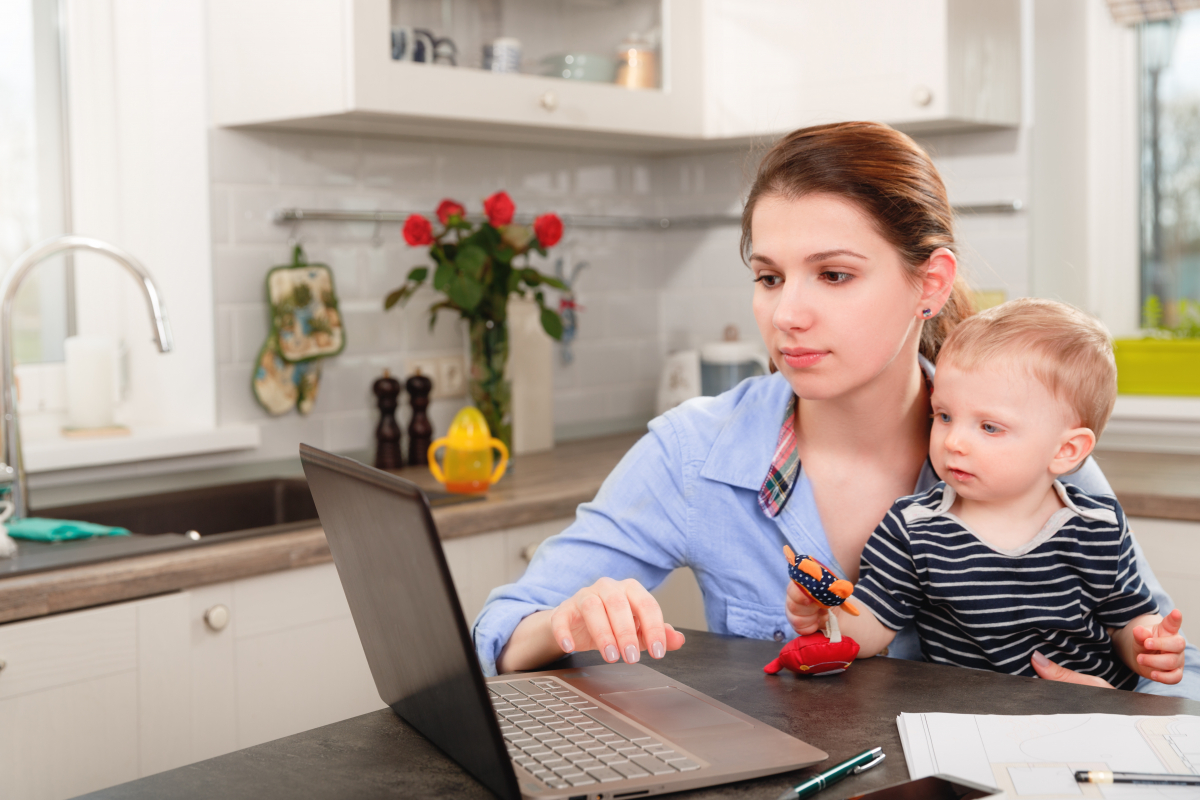Get rid of the teething days!
More days didn’t help, a simplified home office only helped a little. But if you want to make it easier for parents to look after children together, you have to dare to rethink lost days. Otherwise we can do away with them.
Who stays at home when the child is sick? This is a question that worries families, and of course employers too, it is the turn of the federal government and the answer remains the same: mostly the mothers. 72 percent of the applications for child sickness benefit at the DAK health insurance company came from women in the first quarter of 2021. reports the Tagesspiegel. It was 64 percent in Berlin.
The system should be family-friendly: families with two active parents can currently apply for sickness benefit on 30 days a year – per child under the age of twelve and per parent. Single parents get 60 days. The days are a reaction to the corona pandemic, it used to be 10 or 20 days. 90 percent of the net wage is paid. There is only one problem: In Germany, family friendliness is still equated with misogyny. And so the policy of the Children’s Disease Days is ultimately just that: misogynist. Anti-maternal. And completely fallen out of time.
The quality of every policy, every law, is ultimately measured by how it is put into practice. The good thing about daily child sickness allowance is that people who can work from home can also apply for it. But as long as about twice as many mothers take the childhood illness days as fathers do, politics has an effect that is no longer wanted by society: it prevents fathers from fully fulfilling the role of emotional caregiver. At the expense of the mothers.
The background is neither clear nor the same for all families. There are families who make conscious and free decisions. Women were raised to care, and so did they as children. They take the same thing as normal in adulthood. In other families, the jobs are distributed in such a way that it automatically turns out who can stay at home more easily. According to the Federal Statistical Office (Destatis) women in Germany still earn around 19 percent less than men. At the same time is just about every third manager female.
There are still those families in which the father works in a company that requires constant attendance for a career and who do not defend themselves against it. From: “Today I can’t”, over the years it becomes a matter of course that the partner will forego working hours. The result in all cases: his work is done quite regularly, hers not at all. And of course there are the cases where it is the other way around. Of course, we see a trend towards more equitable distribution. And of course there are same-sex couples who negotiate differently. But the problem doesn’t go away from the fact that there are exceptions.
Through the childhood illness days, as they are currently designed, everyone loses:
- The economy loses because one person lacks manpower.
- The team loses because time-sensitive work has to be done anyway.
- The person who stays at home loses because their career suffers, but they still have a lot of work to do after the care work at home. And because she only gets 90 percent of the salary for the days in question, despite the multiple burdens.
- The children lose because the pattern that the mother usually has to do without is carried into the next generation.
- Society loses because childhood days are seen as a threat and having children is often viewed as a problematic whimsy. Waiting rooms are full because parents need a certificate even for harmless infections. And how annoying is it to be sitting in a waiting room sick or with a sick child, just for a bloody form?
So we need a solution that allows both parents to work on a sick day. And to do this, we have to attack a holy grail of our society: the domination of companies. Many people still assume that one working day is dedicated to work and everything else has to take a back seat. And many of these people still assume that a normal working day has eight hours and that these eight hours – plus a lunch break – are ideally spent at the company, but in any case without interruptions from the family.
But in the home office we have already learned how much can be possible if you stretch a little. Let’s assume the classic fever quarantine: The child comes home at noon, feverishly sits on the sofa for the rest of the day and wakes up in top shape the next morning. Then it will have to stay at home for two more days and it will be terribly bored. So what will families do? Three scenarios:
- One person stays at home, does all the care work, should actually be available for the job, will then rework a lot and has worsened their standing in the company.
- They both stay at home for a day alternately, but keep getting urgent calls and emails and every now and then there is a call that would actually be important, but … chocolate muesli! Mouse! Marble run!
I think a third option is the smartest: Both parents stay at home together if their jobs allow. Families need the right to work from home and reduced availability with full payment. Everyone benefits from this because this solution leaves more room for organization and consultation.
The parents discuss their appointments, jerk the days back and take turns in the care work. The result: Both parents will do all of their work. They have around 14 hours to do this, i.e. seven times twice. As most office workers according to a survey Working productively only about three hours a day, so that should fit well, even if someone firmly believes in being productive in more hours. It’s still exhausting, of course. But only for the person who would otherwise have pulled out of responsibility. The bottom line is that it’s easier. And we’re usually only talking about a few days here. You can actually hold out in pairs. If we assume that reproduction is fundamentally desirable in our society, the best solution remains to stay with the children together if possible.
For jobs where presence is really necessary – I mean factories, hospitals or supermarkets, not management jobs or control-addicted bosses – we need other solutions. Half working days would be unrealistic, the travel time ultimately remains. Workers in more precarious jobs also need special protection. However: that already applies now. These inefficiencies are not caused by the children, but by culture and structure in companies.
And I’m really not a fan of bureaucracy, but maybe the solution will then be: Daily sickness allowance for children must be justified. And for these reasons we need:
- clear, objective rules made by society, not lobbyists,
- the duty to distribute the days almost equally,
- Hardship regulations to compensate for longer failures,
- of course, still sick pay for single parents.
And yes, we will jump pretty far if we abolish child sickness benefits. We are used to getting it. But as long as the childhood illness days do more harm than good, everyone would be served if we leave them behind. Because then families can do what they do best: find a creative solution.


